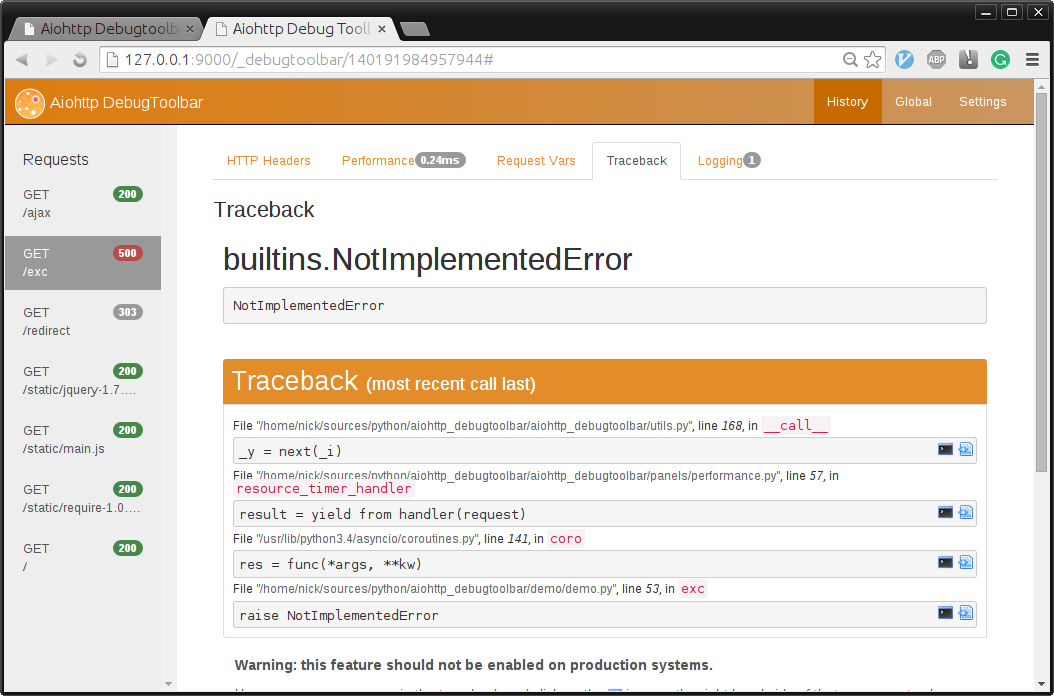
aiohttp_debugtoolbar provides a debug toolbar for your aiohttp web application. Library is port of pyramid_debugtoolbar and still in early development stages. Basic functionality has been ported:
- basic panels
- intercept redirects
- intercept and pretty print exception
- interactive python console
- show source code
HeaderDebugPanel, PerformanceDebugPanel, TracebackPanel,
SettingsDebugPanel, MiddlewaresDebugPanel, VersionDebugPanel,
RoutesDebugPanel, RequestVarsDebugPanel, LoggingPanel
Are you coder looking for a project to contribute to python/asyncio libraries? This is the project for you!
$ pip install aiohttp_debugtoolbar
In order to plug in aiohttp_debugtoolbar, call
aiohttp_debugtoolbar.setup on your app.
import aiohttp_debugtoolbar
app = web.Application(loop=loop)
aiohttp_debugtoolbar.setup(app)import asyncio
import jinja2
import aiohttp_debugtoolbar
import aiohttp_jinja2
from aiohttp import web
@aiohttp_jinja2.template('index.html')
async def basic_handler(request):
return {'title': 'example aiohttp_debugtoolbar!',
'text': 'Hello aiohttp_debugtoolbar!',
'app': request.app}
async def exception_handler(request):
raise NotImplementedError
async def init(loop):
# add aiohttp_debugtoolbar middleware to you application
app = web.Application(loop=loop)
# install aiohttp_debugtoolbar
aiohttp_debugtoolbar.setup(app)
template = """
<html>
<head>
<title>{{ title }}</title>
</head>
<body>
<h1>{{ text }}</h1>
<p>
<a href="{{ app.router['exc_example'].url() }}">
Exception example</a>
</p>
</body>
</html>
"""
# install jinja2 templates
loader = jinja2.DictLoader({'index.html': template})
aiohttp_jinja2.setup(app, loader=loader)
# init routes for index page, and page with error
app.router.add_route('GET', '/', basic_handler, name='index')
app.router.add_route('GET', '/exc', exception_handler,
name='exc_example')
return app
loop = asyncio.get_event_loop()
app = loop.run_until_complete(init(loop))
web.run_app(app, host='127.0.0.1', port=9000)aiohttp_debugtoolbar.setup(app, hosts=['172.19.0.1', ])Supported options
- enabled: The debugtoolbar is disabled if False. By default is set to True.
- intercept_redirects: If True, intercept redirect and display an intermediate page with a link to the redirect page. By default is set to True.
- hosts: The list of allow hosts. By default is set to ['127.0.0.1', '::1'].
- exclude_prefixes: The list of forbidden hosts. By default is set to [].
- check_host: If False, disable the host check and display debugtoolbar for any host. By default is set to True.
- max_request_history: The max value for storing requests. By default is set to 100.
- max_visible_requests: The max value of display requests. By default is set to 10.
- path_prefix: The prefix of path to debugtoolbar. By default is set to '/_debugtoolbar'.
I've borrowed a lot of code from following projects. I highly recommend to check them out:
https://github.com/aio-libs/aiohttp_debugtoolbar/tree/master/demo
